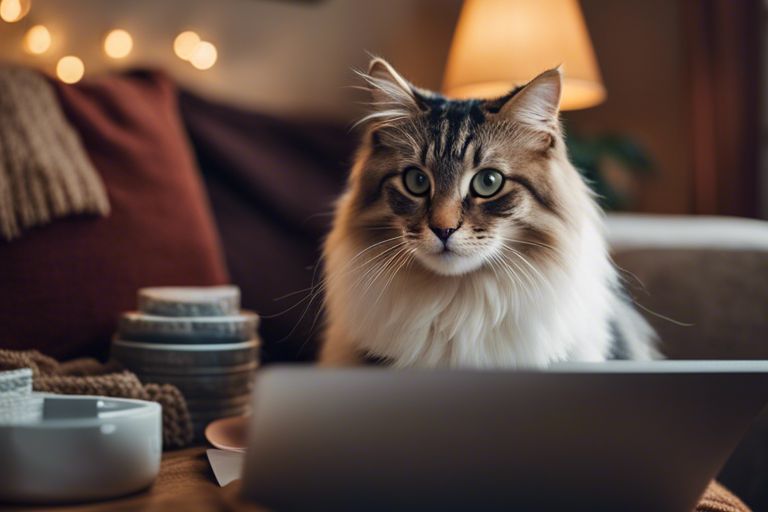Have you ever wondered why your feline friend is experiencing diarrhea? Diarrhea in cats can be caused by a variety of factors and it’s important to understand the potential causes so you can provide the necessary care for your pet. While some cases of diarrhea may be harmless and resolve on their own, others can be dangerous and indicate a more serious issue that requires immediate attention. In this informative blog post, we’ll explore the common reasons why your cat may have diarrhea and what steps you can take to help your cat feel better.
Key Takeaways:
- Dietary Changes: A sudden switch in your cat’s diet can cause diarrhea. It’s important to introduce new foods gradually.
- Intestinal Parasites: These can cause diarrhea in cats. Regular deworming is essential for preventing this.
- Infections: Bacterial, viral, and fungal infections can lead to diarrhea. A thorough examination by a veterinarian is crucial for accurate diagnosis and treatment.
- Stress and Anxiety: Cats can develop digestive issues due to stress or anxiety. Creating a calm environment and providing plenty of mental and physical stimulation can help alleviate these issues.
- Underlying Health Conditions: Diarrhea can be a symptom of more serious health issues such as inflammatory bowel disease, pancreatitis, or kidney disease. A vet should conduct thorough testing to rule out any underlying conditions.
Understanding Diarrhea in Cats
Obviously, witnessing your cat experiencing diarrhea can be concerning. It’s important to understand what might be causing this issue and how to address it. In this chapter, we will delve into the various aspects of diarrhea in cats and provide you with the information you need to identify the potential causes and treatment options for your feline friend.
What is Diarrhea?
Diarrhea in cats involves the passing of loose, watery stools more frequently than normal. This can occur due to a variety of reasons, such as dietary changes, infections, or underlying health issues. When your cat experiences diarrhea, it can be a sign that something isn’t quite right in their digestive system. It’s essential to monitor your cat’s bowel movements and take note of any changes in consistency and frequency.
Common Causes of Diarrhea in Cats
There are several potential causes of diarrhea in cats, ranging from minor issues to more serious health concerns. Some common causes include dietary indiscretion, such as eating something that doesn’t agree with their stomach, food allergies, infections, parasites, gastrointestinal diseases, and stress. If your cat experiences persistent or severe diarrhea, it could be a sign of a more serious underlying issue, and it’s crucial to seek veterinary attention. Your vet can conduct tests to pinpoint the exact cause of your cat’s diarrhea and recommend an appropriate course of action to address the issue.
Diagnosis and Assessment
While there are several common causes of diarrhea in cats, it’s important to consult a veterinarian to determine the underlying cause of your cat’s diarrhea. It could be a result of something minor, such as a sudden change in diet, or it could be a symptom of a more serious underlying health issue. For a more in-depth look at the common causes of diarrhea in cats, you can refer to this informative post on Diarrhea in Cats: Common Causes & When It’s Serious.
When to Consult a Veterinarian
If your cat is experiencing diarrhea for more than a day, or if you notice any other concerning symptoms such as lethargy, loss of appetite, or blood in the stool, it’s important to consult a veterinarian as soon as possible. These could be signs of a more serious underlying condition that requires immediate attention.
Diagnostic Tests for Cat Diarrhea
When you consult a veterinarian for your cat’s diarrhea, they will likely perform a thorough physical examination and may recommend diagnostic tests such as fecal analysis, blood work, and potentially imaging studies to determine the exact cause of the diarrhea. These tests can help identify any underlying medical issues and guide the most appropriate course of treatment for your cat.
Treatment Options
For the treatment of your cat’s diarrhea, there are various options to consider. It’s important to address the issue promptly to prevent dehydration and discomfort for your pet. Here are some treatment options to consider:
Home Remedies and Over-the-Counter Solutions
If your cat is experiencing mild diarrhea, you may be able to address the issue at home. It’s important to ensure that your cat has access to clean, fresh water at all times to prevent dehydration. Additionally, you can try feeding your cat a bland diet, such as boiled chicken and rice, to help settle their stomach. There are also certain over-the-counter solutions, such as probiotics, that may help restore the balance of healthy bacteria in your cat’s gut. However, be sure to consult with your veterinarian before administering any over-the-counter treatments to ensure they are safe and appropriate for your cat’s specific condition.
Medical Treatments and Dietary Adjustments
If your cat’s diarrhea is persistent or severe, it may be necessary to seek medical treatment from a veterinarian. Your vet may recommend specific medications to address the underlying cause of the diarrhea, such as antibiotics or anti-parasitic drugs. In some cases, dietary adjustments may also be necessary to help manage your cat’s condition. Your vet may recommend a prescription diet or specific changes to your cat’s regular diet to address their gastrointestinal issues. It’s important to follow your vet’s recommendations closely and monitor your cat’s progress closely to ensure they are responding well to the treatment.
By addressing your cat’s diarrhea promptly and effectively, you can help alleviate their discomfort and prevent any potential complications. Remember to always consult with your veterinarian before trying any home remedies or over-the-counter solutions, and follow their recommendations closely for the best outcome for your feline companion.
Preventing Diarrhea in Cats
Your cat’s health is important, and as a pet owner, it’s crucial to take steps to prevent diarrhea in your feline friend. There are several factors that can contribute to diarrhea in cats, but by taking proactive measures, you can help keep your cat healthy and happy.
Importance of Dietary Management
One of the key factors in preventing diarrhea in your cat is managing their diet. Ensuring that your cat is fed a high-quality, nutritionally balanced diet is essential for their overall health and can help to prevent gastrointestinal upset. Avoid feeding your cat table scraps or foods that are high in fat or difficult for them to digest. It’s also important to transition your cat’s diet gradually if you need to switch to a new food to avoid upsetting their digestive system.
Environmental and Lifestyle Factors
In addition to diet, your cat’s environment and lifestyle play a significant role in their digestive health. Stress and anxiety can contribute to diarrhea in cats, so it’s important to create a calm and secure environment for your pet. Additionally, be mindful of potential toxins and hazardous substances in your home that could cause gastrointestinal upset if ingested. Regular exercise and mental stimulation are also important for your cat’s overall well-being, including their digestive health.
- Minimize stressors in your cat’s environment
- Avoid toxic substances such as certain plants and household chemicals
- Provide opportunities for exercise and mental stimulation
The overall goal of preventing diarrhea is to create a healthy and positive environment for your cat. By paying close attention to their diet, environment, and lifestyle factors, you can help to minimize the risk of gastrointestinal upset.

Why Does My Cat Have Diarrhea?
Considering all points, it’s important to note that diarrhea in cats can be caused by a variety of factors. From dietary changes and allergies to underlying health conditions and parasites, there are many potential reasons for your cat’s digestive issues. It’s essential to consult with a veterinarian to determine the specific cause and develop a treatment plan tailored to your cat’s individual needs. Additionally, be mindful of your cat’s diet, ensuring that they are receiving a balanced and high-quality food that suits their unique requirements. By addressing these potential causes and working closely with your vet, you can help improve your cat’s digestive health and overall well-being.
FAQ
Q: Why does my cat have diarrhea?
A: There are several possible reasons for your cat to have diarrhea, including dietary changes, food allergies, infections, parasites, and underlying health conditions. It’s important to consult with a veterinarian to determine the specific cause and appropriate treatment for your cat’s diarrhea.
Q: What should I do if my cat has diarrhea?
A: If your cat has diarrhea, it’s important to monitor their condition and make sure they have access to plenty of fresh water. You should also consider their diet, as certain foods can exacerbate diarrhea. If the diarrhea persists for more than 24 hours or is accompanied by other concerning symptoms, such as lethargy or vomiting, it’s crucial to seek veterinary care promptly.
Q: How can I prevent my cat from getting diarrhea?
A: To help prevent your cat from getting diarrhea, it’s essential to provide them with a balanced diet that is appropriate for their age and health status. Avoid sudden dietary changes, and make sure your cat is up-to-date on their vaccinations and parasite control. Additionally, minimizing their exposure to potentially contaminated environments and providing regular veterinary check-ups can help maintain their overall well-being and reduce the risk of diarrhea.

Jayley, a devoted cat enthusiast, also writer for other cat blog as well. She aims to dedicated to providing comprehensive information, insights, and advice on everything you’d ever want to know about our whiskered companions.
